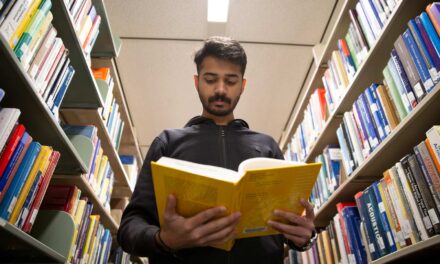
ASU student coders prepare for tech careers
The Google Developer Student Club helps students gain the skills and network needed in a competitive industry
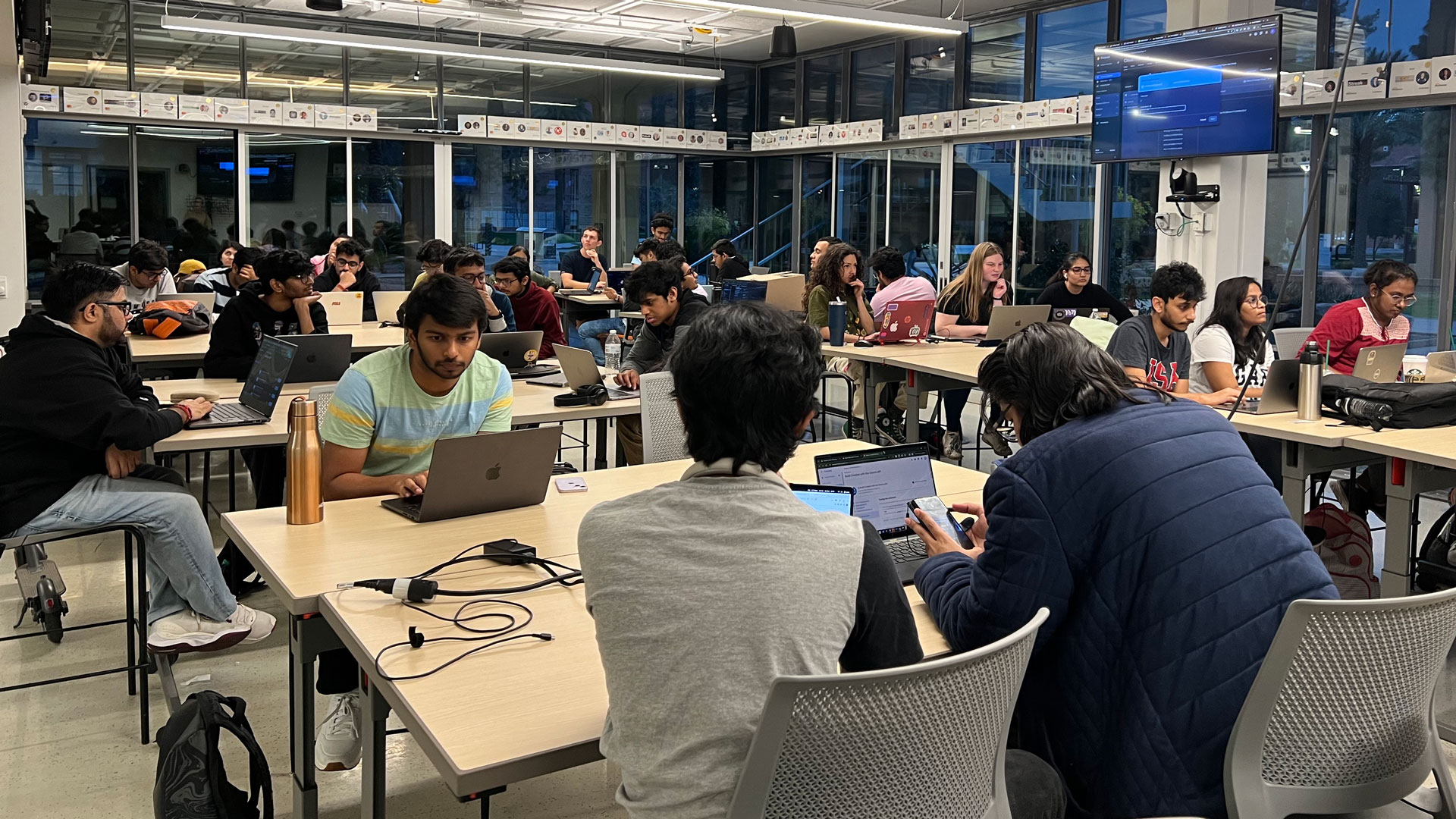
Learning to code is a rewarding activity for many. The ability to solve complex problems and create tools to help people in their daily lives are some of the reasons why people decide to pursue computer science and software engineering degrees.
However, the outlook for this career field is troubling to some students. More than 240,000 tech jobs were cut through layoffs in 2023. The trend is continuing into 2024, with about 25,000 layoffs happening in January at tech companies large and small in a variety of industries.
“The recent layoffs have been worrying,” says Ananya Bist, an international student at Arizona State University pursuing a master’s degree in computer science.
“I have a clear idea about the kind of work I want to do,” she says, “but I have realized that I need to be more flexible in the early stages to find my footing in the industry.”
Even as the job market has become increasingly competitive, students and new graduates still have plenty of opportunities to pursue their programming dreams with the right skills and a robust support network.
The Google Developer Student Club, a student organization in the Ira A. Fulton Schools of Engineering at ASU, has been a valuable resource for Bist and the university’s community of coding enthusiasts. The organization’s goal is to help students interested in topics from developing software for mobile apps to machine learning to generating new skills and making connections with their peers, alumni and industry professionals.
“We recognize the importance of preparing our members not just with technical skills, but also with the resilience and adaptability required in today’s dynamic job market,” says Arnav Aghav, a computer science student in the Accelerated Master’s degree program in the Fulton Schools and president of the ASU Google Developer Student Club.
About the ASU Google Developer Student Club
The Google Developer Student Club, known as GDSC, is part of a worldwide network of more than 2,100 groups supported by Google to empower students to learn to solve real challenges with technology.
ASU’s club was founded in 2019 by computer science alumni Ananay Arora, who is now working at an artificial intelligence and financial technology startup, and Andrew Hill, now a software engineer for Apple’s media applications engineering team.
Students from all backgrounds and majors who are interested in software development, emerging technologies and the desire to gain practical skills are welcome to join and be empowered with the knowledge they need to achieve their coding goals.
Computer science sophomore Aryan Keluskar was drawn to GDSC because of its focus on teaching skills relevant to industry, with some workshops being taught by alumni and professionals.
“I really like how the core team always goes the extra mile to make their workshops seamless for all to comprehend, be it livestreaming the event or making their code accessible to all,” Keluskar says. “I have made really great friends and discovered people with similar interests to potentially pursue projects together.”
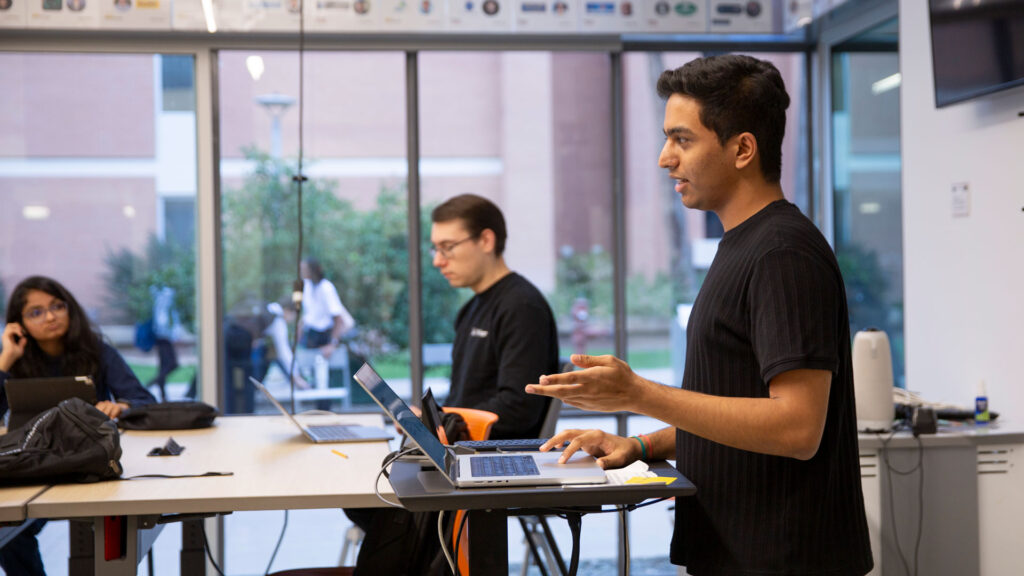
GDSC president Arnav Aghav, GDSC technical officer Pavel Ryabov (pictured in the background) and other GDSC leaders host workshops about numerous languages, frameworks and platforms. These workshops spark project ideas that help students boost their skills in topics relevant to many industry careers. Photographer: Erika Gronek/ASU
Helping students prepare for software careers
One of GDSC’s primary activities at ASU is holding “bite-sized” software workshops to learn and practice modern software development skills. Topics have included Android, iOS and Google software ecosystem programming projects as well as data structures, algorithms and machine learning topics.
The workshops are designed to enable attendees to build something with help from the instructors and teaching assistants, collaborate to solve problems and go home with a project, Arora says.
Pavel Ryabov is a GDSC technical officer who plans the club’s workshops, prepares code and other materials, and helps students during the events. He says the ability to provide students with exciting new projects is “one of the crucial parts of GDSC’s workshops.”
“Our workshops aim to introduce students to cutting-edge technologies that are dominating in the industry and excite them by creating the initial project together,” says Ryabov, a computer science major. “We make sure to provide students with enough materials for them to successfully continue the adventure with this technology by suggesting how the current project can be enhanced and what should be done to achieve that.”
Arora and Aghav note that members often share their successes — such as winning a hackathon or landing an internship — after attending various workshops.
“We got mentions from students that they were able to apply this directly to their projects and competitions,” Aghav says, noting one participant even won an ASU Devils Invent design challenge based on a workshop that taught the Swift programming language for Apple devices.
“The participant attributed his victory to the practical skills and knowledge acquired during our iOS workshop, which enabled him to develop a standout application,” Aghav says.
This academic year, the club has expanded the workshop topics to help students build adaptable skills and take advantage of the full range of software engineering careers. One of those workshops focused on contributing to open source software.
“Open source software plays a crucial role in the tech project development process, so learning how to understand, use and benefit from it early in your career is very important,” Ryabov says. “Publicly available software that is well-built and is regularly maintained is a perfect ground for learning and understanding project structure, documentation and proper coding techniques.”
Ryabov says reverse-engineering this kind of software and studying Git repositories is more effective than only studying theory to learn the rules of programming.
“Our goal at GDSC is to introduce students to the practical part and motivate them to see how things work ‘under the hood’ by working with existing codebases,” he says.
Another opportunity Aghav has developed is a new series of industry speaker events. The first event, held in fall 2023, invited PayPal professionals Courtney Ngai, a senior software engineer and ASU computer science alumna, and Porter Casdorph, a PayPal tech talent sourcer and recruiter, to speak to about 100 students. Their talk focused on the technical projects happening at PayPal, internship tips, and recruiting and hiring practices.
“The speakers shared wonderful insights on how deep the hiring practice goes, including how a hierarchy of factors is evaluated on a candidate’s profile,” Aghav says. “It was a productive career-prep-oriented workshop that gave insights into the point of view of the recruiting side for students to sharpen their applications.”
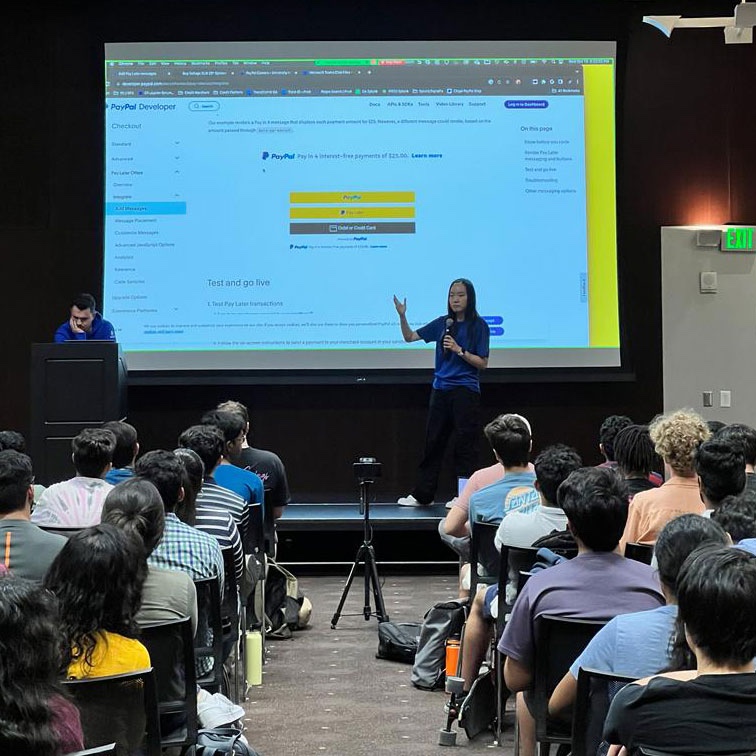
Courtney Ngai, a PayPal senior software engineer and ASU computer science alumna, speaks to a group of students from the Google Developer Student Club about PayPal technology and career preparation strategies. Photo courtesy of Arnav Aghav
Ngai shared that many of the desired skills for job applicants — such as being able to collaborate with a team and use algorithms and data structures — haven’t changed. However, remote work opportunities mean the applicant pools are larger and more competitive. This is where GDSC’s opportunities, such as the recent open source software workshop, can help.
“By contributing to open source software, you gain experience around understanding how an existing codebase is structured and operates,” Ngai says.
Ngai’s advice for students is to explore their curiosities and “give yourself the green light.”
“After graduation, I went from working on building user interfaces to building APIs and now doing full-stack development and leading projects,” Ngai says. “The learning doesn’t stop after college and your career path isn’t linear.”
Bist’s biggest takeaway from the event was learning about the current state of the industry, which she says will help her refine her job search approach.
As Keluskar advances through his bachelor’s degree program, he says he will “remember the advice of the recruiters in order to better match their expectations and stand out from the crowd.”
Britton Fischer, a computer science student in the Accelerated Master’s degree program, found the event to be an excellent networking opportunity. After initially connecting before the presentation, Fischer has continued to work with Casdorph to better prepare him for a software engineering career.
“[Casdorph’s] valuable insights and substantial assistance has not only improved my resume but also enriched my understanding of the industry as a whole,” Fischer says, “which I believe to be instrumental in advancing my career.”
Powering up more opportunities
In addition to improving GDSC’s current opportunities to make them more helpful and engaging, Aghav and the leadership team are designing new events and resources for students to prepare for their careers.
This year, Aghav added a member-exclusive resume database that helps students connect with partnering technology companies and be considered for internships and full-time positions.
He is also planning to host partner project opportunities this spring in which club members can participate in a collaborative engineering project with a local business, institution or nonprofit organization.
To tap into students’ enthusiasm for creative hackathons, which sharpen skills and build portfolios, the GDSC leadership team is planning additional opportunities, such as Google Summer of Code, to build upon students’ open source programming skills.
“We hope to match our enthusiastic members with meaningful professional opportunities,” Aghav says. “Covering these multiple facets of software engineering practices will aid our members in tapping into the broader variety of projects out there.”
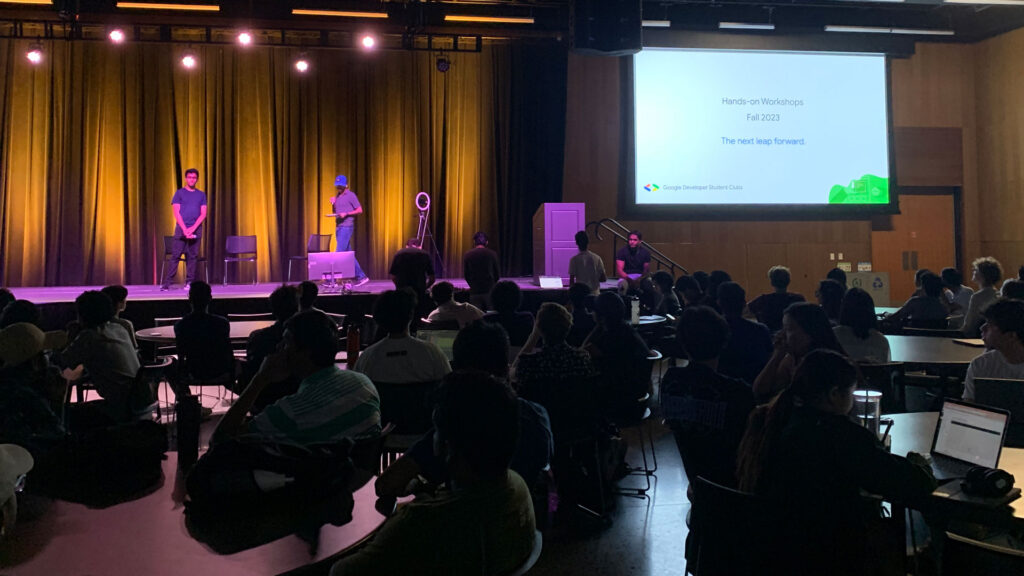
ASU students of all abilities who are interested in software and coding can join a community of more than 1,000 students and alumni to learn new skills and network with like-minded peers and industry professionals. Photo courtesy of Arnav Aghav/ASU
Join the club
When Ngai was a student at ASU, she didn’t get a chance to join a developer student club. After working with GDSC as a tech industry professional, she sees it as a valuable career preparation opportunity.
“If I had been involved in something like GDSC, I feel that I would have gained more insight into the different fields within software engineering, such as back-end versus front-end development, and heard about product management, which I didn’t even know was a career until after being in the real world,” she says.
Aghav says those who join the club will find a supportive community in GDSC’s more than 1,500 active members, which include current students, alumni and industry professionals.
“Whether you are a beginner curious about learning modern software tools and app development or an experienced developer practicing your skills,” he says, “GDSC offers opportunities for all.”
To get started, check out the Google Developer Student Club website and join the Discord channel for information about upcoming events.
ASU alumni advice for current students
Arizona State University alumni and current industry professionals share their advice with current students who plan to pursue careers in the tech industry.
Courtney Ngai, an ASU alumna and a senior software engineer at PayPal, encourages students to ask questions, build mentorship connections and work on their own passion projects.
- Don’t be afraid to ask questions: For an internship and even transitioning from student to full-time career, you’re not expected to know everything. By asking questions, you’ll be able to gain a better understanding of how your project or work factors into the bigger picture of a company’s product roadmap and ecosystem.
- Build your network of mentorship: There are a lot of industry professionals who are happy to give back and share what they’ve learned throughout their careers. During an internship at PayPal, you’ll be paired with both a mentor and a buddy, which I was grateful for when I interned at PayPal.
- Use your curiosity to create personal passion projects outside of your coursework: This will help you gain an understanding of what you enjoy working on, dive deeper into technologies and frameworks, and learn more about how what you’re building helps solve a customer’s need.
Andrew Hill, a co-founder of the Google Developer Student Club at ASU and current software engineer at Apple, advises students on personal projects and how GDSC can help them.
- Work on something meaningful to you.
- Set a reasonably high bar for your projects and follow through.
- Any student who is interested in a tech career should give GDSC a try. Consistently attending GDSC workshops exposes students to numerous languages, frameworks and platforms. This breadth of experience is beneficial in the early stages of a career and helps strengthen intuition.
- Look at GDSC as a steppingstone to something bigger. The club will provide value to students interested in going beyond what they’re doing in the classroom and building software to make a real-world impact.
Ananay Arora, a co-founder of GDSC at ASU who is now working at an artificial intelligence and financial technology startup, shares his entrepreneurial experience and advice to students for figuring out their place in the tech industry.
- Working at a startup is very different from being in a traditional corporate job. You get to work your own hours, which means I can code at night. The best part is you get to build and own the project or product you’re building for the startup, which is where the fun is.
- Software engineering is incredibly broad. Joining GDSC will help you test the waters with different technologies. More exposure with hands-on experiences means it is easier to figure out what you love to do and that’s the goal of the bite-sized workshops.
















